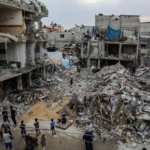Events in Nigeria can be quite consuming of anyone’s physical and intellectual energy and attention. What with the abductions of hundreds of school kids, the comic yet tragic demand for N40 trillion in ransom for their release, the hardships and ever-rising inflation in the prices of goods and services across the country, the persistent lack of electricity or internet, and the sad reality that those entrusted with power to help solve, or at least alleviate, those problems are almost entirely oblivious of them, and are instead busy padding the national budget to stuff up their own already fat individual pockets.
For the writer, as for the average citizen, it is difficult to bracket off all of these things—and more—to think about anything else around the world. Yet, every now and again in my private moments and thoughts, I always find myself going back to Gaza and the horrific events still going on there since October last year, again and again. Now we are in Ramadan, a holy and sacred month in Islam, and it is impossible not to think of what is going on now over there. Yet, thinking about Gaza has turned out to be, for me, a most difficult experience: it is both incomprehensible and unbearable at the same time.
However much you try, you cannot but keep wondering why 80 years of constant violence against the same hapless people is not enough to find an enduring solution or why with over 30,000 of the same people killed—more than half of them women and children—should not be enough for the world to call for and enforce a ceasefire in Gaza, at least in honour of Ramadan. How is it that the greatest injustice of our time is going on in real time, and yet the whole world seems incapable of even addressing it seriously, let alone putting a stop to it? Why is there such wicked impotence where action, indeed humanity, is needed the most?
On the night of Friday last weekend, Israeli strikes killed 36 members of the same family in the al-Nuseirat area in central Gaza, France 24 reported on Saturday night. The relatives were gathered to observe iftar, the Muslim act of breaking the fast immediately after sunset during each day of Ramadan. And from there to their deaths, just like that. This was not the first time. Al-Jazeera English reported that at least three people were killed by Israeli strikes on the night of Monday, March 11, that is, the first night of Ramadan. If experience is anything to go by, and there is nothing else to, by Israeli targeting and killing of Palestinians in Gaza, as well as in the West Bank where there is supposedly no war, will go on throughout this Ramadan. And yet, even to report it, to say it that it happens, and to say it as it happens, will prove difficult if not impossible altogether. Meanwhile, Israel gets to continue its blatant murder of Gazan women, children, and men in the name of fighting a war with Hamas, an organisation that has all but fled Gaza or live in tunnels few can reach.
- 4 feared killed in Kogi communal clash
- Demolition: LASG, LG warn traders, others to leave rail tracks
The hypocrisy of it all is blinding. Until last October, every now and then over the past 10 years, American and European leaders, and their media, would raise the issue of Chinese repression and violations of the human rights of its Uyghur population, a Turkic Muslim people native to the Xinjiang province in China. Occasionally, though less frequently, they would also raise the issue of the persecution, discrimination and displacement of the Rohingya in Myanmar, a Muslim minority people of Bangladeshi ancestry living in the Burmese coastal state of Rakhine. Even the International Court of Justice accused officials of the Myanmar government of genocide, if half-heartedly. Far less frequently, they also talk about the rising Islamophobia in India in the past few years, if only in whispers.
By raising all of these issues from time to time, and keeping them on the global news agenda, Western officials and their media sought to pass themselves off as not just as universal champions and defenders of human rights and protectors of religious minorities, but also as “Muslim loving”. And to whatever little extent it worked as designed. But we must now know that it was, and remains, no more than strategic political rhetoric deployed to water down the anger and disappointment in Muslim hearts against the reckless adventures of the so-called “war on terror”, or a whip with which to bully rivals like China.
More importantly, we must all now know that Western officials’ occasional pretensions to be standing up for Muslims in China and Myanmar were probably no more than attempts to deflect global Muslim attention away from the Israeli-imposed horrors in Palestine, if now on a higher scale. Occasionally, raising the dust about the Uyghurs in China and the Rohingya in Myanmar by Western officials and media was never about recognising their human rights or even about exposing the atrocities of the countries they don’t like. Rather, it was all about hiding even worse atrocities by the country they do like, Israel.
Since October last year, for example, hardly any Western official or media has said anything about the Rohingya or the Uyghurs, and certainly nothing about the Muslims in India, since, as it happens, Indians are the most vociferous supporters of the Israeli campaign of murder in Gaza over the past six months, outside of Israel itself. And this is where we come to the crux of the matter: despite Western normative universalism about human rights, they still value some lives higher and above others, at every turn and in every circumstance. And the lives valued the least in today’s world affairs are Muslim lives and African lives.
There is plenty of evidence for this valuing and devaluing of certain lives over others in the world, not least the amount of attention, the kinds of frames and labels used to describe certain lives, for example, Africans or Muslims, in conflict and peace, by Western officials, their governments and institutions, and their media, in the past or now. Yet, Ramadan in Gaza is the way it is today not just because of the long-running tendency by Western governments and their institutions to dehumanise and devalue Muslim life. The Muslim world must also bear some responsibility for why Ramadan in Gaza is the way it is today.
Islam is the second largest religion in the world, after Christianity, with nearly two billion people. More than 50 countries—over a quarter of the UN member states—count themselves as straightforwardly Muslim countries, as Muslim majority countries or at least, as countries with significant Muslim populations, many of them as rich as any other countries in the world. Yet, the political impotence of Muslims in world affairs is nothing short of astounding. The reasons for this are many and complex, and would require our meeting on these pages in another week. For now, it is sad enough that Ramadan in Gaza does not need to be the way it is today. The rest of the world can help; but Muslim countries and Muslims can also do more to bring about peaceful and enduring change.

 Join Daily Trust WhatsApp Community For Quick Access To News and Happenings Around You.
Join Daily Trust WhatsApp Community For Quick Access To News and Happenings Around You.

